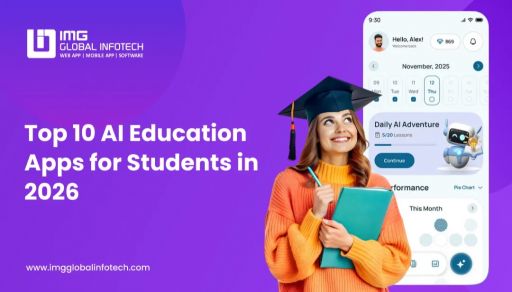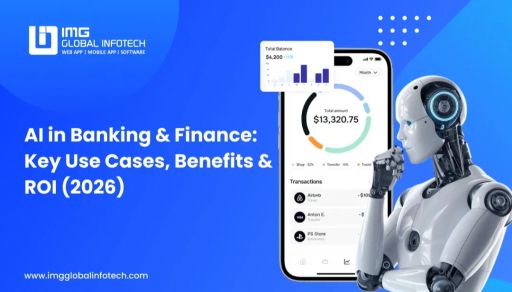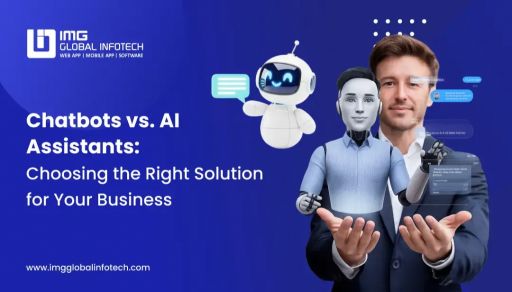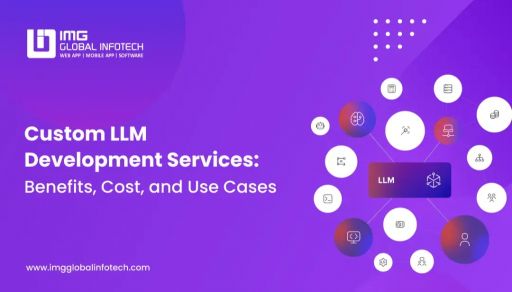AI Software Development Process, Cost, And Key Features Explained
Lokesh Saini
Jun 18, 2025

Artificial Intelligence (AI) is transforming the way companies conduct business, offering more intelligent responses, automating tasks, and facilitating informed decision-making. There is no doubt that how companies leverage AI is changing at lightning speed. As more businesses adopt and implement AI, companies focused on software development must understand what "software development for AI" entails. This blog will cover the entire AI software development process, from assessing business problems to defining data to model training, testing, deployment, and performance monitoring. There are some key attributes that make AI applications potent; we will touch on them. We will also explore the development costs at varying levels of complexity, technologies, and teams. For a startup looking to add AI functionality or for an enterprise that plans to "scale" its AI capabilities, this blog will give a way of looking at what it means to build AI-based software.
What is AI Software?
AI software development refers to the practice of creating applications that can mimic intelligent human behavior by learning from data, identifying patterns, and generating decisions based on pre-defined parameters. In AI software, the process involves several steps, including data collection, model training, algorithm sets, and system integration. Some types of AI software can include machine learning, natural language processing (NLP), and computer vision (CV). AI has the ability to help companies automate manual tasks, improve accuracy, and extract valuable business insights to drive decision-making beyond expectations in terms of improving user experience.
Also Read - Best AI Software Development Companies
Key Features of AI Software
These features listed below will provide you with detailed information on how AI is transforming the software development process. So, let's get this segment started.
Machine Learning Integration
Allows the software to learn from the data to adapt over time while increasing performance without the need for specifically coding it while making the software smarter and more efficient with every experience or data input.
Natural Language Processing (NLP)
Enables contextual understanding of human language and comprehension, allowing AI to recognize, interpret, and produce human language that improves and enhances user experiences on chatbots, voice assistants, text analytics, etc., while detecting sarcasm, intent, and user sentiment.
Predictive Analytics
predictive analytics is the act of using historical data to make predictions about future events so that business colleagues can make informed decisions, improve operations, reduce risks, and avoid uncertainty in situations related to sales forecasting, inventory management, or customer behavior.
Image and Video Recognition
It involves analyzing and processing images and videos, which allows the AI to detect objects, faces, or any activity immediately (out of the dataset), and marketable examples could include surveillance, healthcare, automotive, retail, and advertising.
Automated Decision-Making
Uses algorithms to achieve data-driven decision-making without the need for human intervention in scenarios where people and time can burn up processes such as loan approvals, fraud detection, or supply chain management.
Real-Time Data Processing
Processing adheres to streaming data, which enables AI systems to instantly analyze and respond to data in emerging conditions. Within finance and e-commerce, real-time processing is imperative; autonomous vehicles that operate instantly while data is being streamed are prime examples of real-time processing capability.
Personalization Capabilities
Personalization delivers customized experiences to users based on user behavior and characteristics; personalization is widely used in recommendation strategies; think Netflix, Amazon, or social media feeds as personalized experiences.
Data Visualization
Transforms data insights that are complex into interactive visual formats, allowing stakeholders to show a variety of trends, patterns, and metrics to promote better strategic planning and reporting.
Speech Recognition
Converts spoken language into texts for voice-controlled interactions for applications such as virtual assistants, customer service bots, or transcription tools.
Context Awareness
Understands the context and user interactions as well as environmental elements and factors, which lets them provide responses that are more relevant and intelligent in real-time applications like smart homes or mobile apps.
Cognitive Automation
Combines AI with robotic process automation to simulate the way humans perform decisions and actions, which enhances automatic performance in repetitive tasks in departments such as HR, finance, and customer service.
Multi-language Support
Supports the processing and understanding of multiple languages, which enhances inclusivity and global communications for global users utilizing voice, text, or chatbot interfaces.
Self-Learning Ability
An AI program learns and improves from new data and automatically updates itself continuously. This is important because it means the software will be current, accurate, and effective when used as a dynamic process in unpredictable situations.
Security and Threat Detection
When monitoring a system, an AI detects anomalies and potential threats and can prevent cyberattacks, etc. AI provides sophisticated pattern recognition and can respond in real time to threats.
API Integration
Integrates easily with other software, platforms, or databases through means of an API. Integration can even be done into existing workflows. Automating processes and the capabilities of AI expand as they integrate into systems.
Also Read - AI In Real Estate
AI Software Development Process
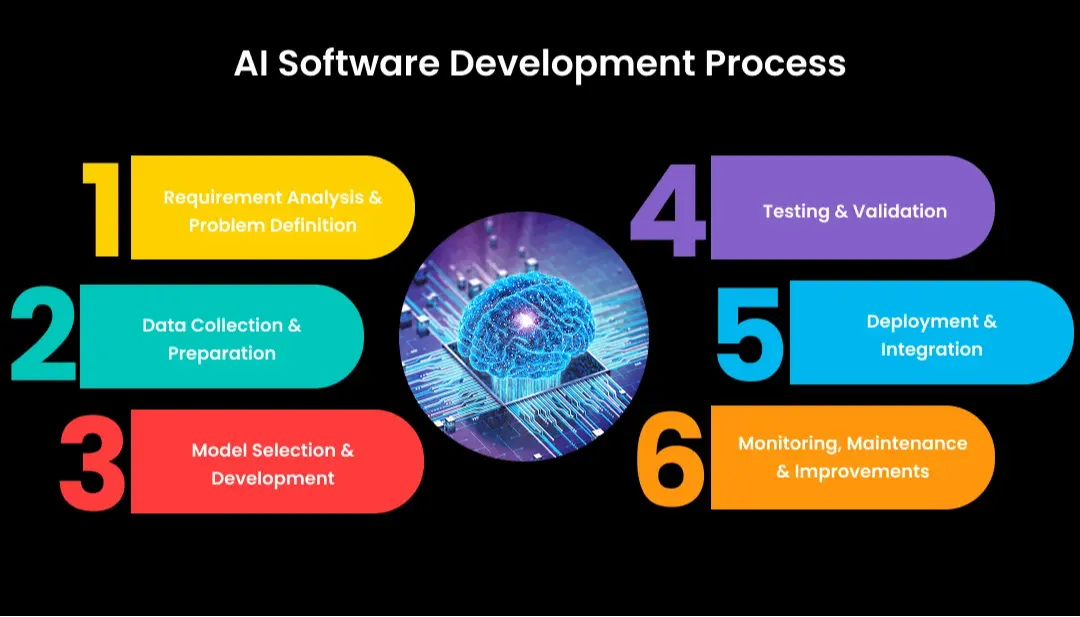
AI in software development process has a systematic path that leads to creating rigorous, usable, and useful applications. Let us know how AI will change the software and app development process with an AI development company. Here are the six stages to get you to the end stage of your AI systems:
1. Requirement Analysis & Problem Definition
The first stage of the software development process will involve a series of deep conversations between you, the client, and the AI development company to get an overview of the business objectives you want the AI solution to achieve, the issues you are trying to solve, and the project outcomes. At this stage, the development team needs to determine what problem the AI solution will solve and the success criteria. This stage of AI in the software development process can set the course for the project and help you determine the goals and deliverables of each stage.
2. Data Collection & Preparation
The most important stage of the AI software development process is quality data. In this stage, the AI development company will determine what data is needed, collect and source the data from your internal asset and third-party databases, and either through direct access or use an API. When the data is collected, it will be cleaned, normalized, and transformed into either structured data or another usable format for the next stages.Many businesses also leverage Snowflake consulting services at this point to ensure seamless data integration, advanced warehousing, and scalability for AI-driven initiatives. This is a significant step in the project as it is important the AI model relies on data quality and relevance when it is created.
3. Model Selection & Development
When the data is ready, the data scientists and AI engineers can finalize algorithms and/or machine learning models for their problem (i.e., classification, regression, clustering, or deep learning techniques) and solve it to produce a working AI model and then test different models to determine their accuracy and usefulness. This stage of the AI software development process is an iterative process to assist with feature engineering the AI system and getting the best results with it.
4. Testing & Validation
Prior to deploying it for full use, the AI model will go through extensive testing with validation datasets. The testing process may reveal potential biases, errors, or inconsistencies in its predictions. The development team will use performance metrics to evaluate the model (e.g., accuracy, precision, recall, and F1-score) to validate that the model will meet stated business expectations and requirements and meet industry standards.
5. Deployment & Integration
Following validation, the AI software is released in the client's environment. This stage of the AI software development process will be performed by the AI developer, ensuring that the AI for software development will be able to work or integrate cleanly with existing tools, databases, or platforms. The existing tools may be cloud-based, on-premise deployment, or Mobile App Development. The primary focus of this stage is to provide a finished product that is scalable and a working AI Solution.
6. Monitoring, Maintenance & Improvements
Once the AI solution is deployed, it is important to continually monitor how the AI solution/ML model is performing in a real-world environment. The AI development company will have already put its maintenance and support policies in place for AI Solutions to deal with any issues and environmental or deployment variables, update the models as new data is acquired, and add additional features based on suggestions and feedback. The monitoring and maintenance of the AI software are critical to the long-term advantages and flexibility of the AI/ML model.
How Much Does AI Software Development Cost?
The cost to develop AI software is very variable; it could cost slightly less than $10,000 dollars, to well over $100,000, and perhaps more depending on how complex, how big, and the goals of the application. Depending on whether you are developing a basic chatbot or a complex predictive system, all have cost variables that will change how much it will cost to develop AI software.
1. Project Complexity
To reiterate, for most projects, the more complex the project will be, the higher the software development cost. Simple AI tools (e.g., rule-based chatbots) are easier and cheaper to develop, while more complex applications using deep learning, natural language processing, or computer vision require more time, money, and skill.
2. Type of Data and Amount of Data
AI systems need large amounts of quality data to function. If the data had to be collected, cleaned, or labeled by hand, there would be an increase in the cost of developing App. Some of the more complex models may also require real-time data or third-party datasets.
3. Technology Stack
What tools, frameworks, and platforms were used to develop the application could also have a pricing impact. For example, using open-source tools such as TensorFlow or PyTorch may help reduce the cost of developing a software if you were using a Licensed version of a commercial tool. Additionally, using a commercial AI platform or calling a cloud-based API from Amazon Web Services, Google, or Microsoft will also raise the AI Chatbot development cost.
4. Development Team and Location
The cost of experienced AI developers, data scientists, and engineers is also a significant contributor to development costs, as costs vary between countries/regions. For example, developers in North America and Western Europe tend to charge substantially more than teams who work in countries such as India or Eastern Europe. To balance quality and budget, many businesses prefer working with a nearshore team, which offers the advantage of similar time zones, smoother communication, and competitive pricing without compromising expertise.
5. Ongoing Maintenance and Scalability Requirements
A system is not just an initial development; it will require maintenance, retraining of models, upgrades to the system, and so on. Having an application that requires continuous learning, integrated multiple systems, or scaling dependent on user needs will have a considerably higher ongoing maintenance and cloud infrastructure cost.
AI for software development offers immense potential for transformation.
However, accurately budgeting for AI requires estimating these essential factors. Engaging a competent AI development company allows you to exploit cost efficiencies without compromising performance or scalability.
Artificial Intelligence Software Development Challenges
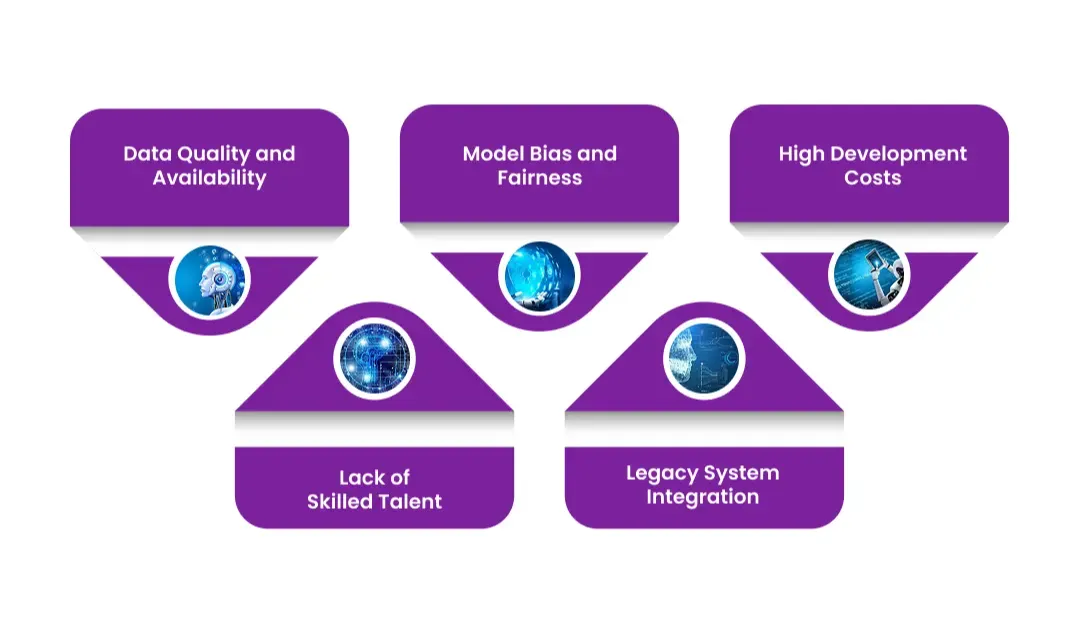
AI software development represents a huge potential; however, the highly technical, ethical, and operational challenges of development must be navigated, and that takes diligence from the developers and the businesses they represent.
1. Data Quality and Availability:
One of the biggest challenges in implementing AI is for developers to acquire a significant amount of high-quality, relevant, and available data. Software development intelligence is only as good as the data the model learns from, and if it learns from poor data, it will yield poor or biased outcomes. Not only must the initial data/data set be clean and preprocessed, but it also takes time to develop and preprocess, which adds to its complexity.
2. Model Bias and Fairness:
An AI's decision-making process may inadvertently reinforce existing bias that is contained in the data. Doing unbiased and transparent decision-making in AI algorithms is an important issue in manageable AI and software development design. This becomes more challenging as AI-driven software development decisions are being used in sensitive situations like recruitment, lending, or law enforcement.
3. High Development Costs:
AI software development can be very resource-intensive. You need the right skillset (These can be expensive, and you typically require multiple professionals that possess the right skills.), the right infrastructures (data center, cloud, testing dev, etc.), and you need to constantly develop, manage, and test your AI software, which means high upfront costs that can be burdensome, especially for small businesses or startups.
4. Lack of Skilled Talent:
AI and software development require individuals who are proficient in relevant areas like machine learning, data science, and software engineering. The lack of employees with deep knowledge of AI-driven software development makes it difficult for organizations to create an in-house team that can help each organization develop and leverage AI effectively.
5. Legacy System Integration:
When attempting to incorporate AI and software development technology, system integrations within an organization are often challenging due to differences in data structures, technology stacks, and workflows, which can create compatibility issues and extend the time to deployment.
Conclusion
AI software development is a great way to enable the transformation of a business through complete automation, data-driven decision-making, and intelligent solutions. Knowing the entire process for development, how to consistently develop AI software for strategic business initiatives, and factors that will affect the cost of development will aid in making more informed and prudent investment decisions. AI also offers a virtually endless domain, including machine learning and natural language processing, etc., for the next frontier of data-driven disruption.
Whether you're a startup or enterprise, partnering with one of those AI development companies will safely ensure seamless execution, unlimited scalability, and utmost innovative ability. As AI-driven software development evolves, leveraging it into your operations could deliver a huge competitive advantage in today's tech-dominated landscape.
Lokesh Kumar is the Digital Marketing Manager & SEO Content Strategist at IMG Global Infotech, a top-rated Web & Mobile App Development Company. With extensive experience in digital marketing, SEO, and content strategy, he specializes in boosting online visibility and driving organic growth for startups, SMEs, and global brands. Lokesh is passionate about creating SEO-friendly, user-centric content that not only ranks but also converts. His deep understanding of digital trends and search algorithms helps businesses thrive in a competitive online space.



